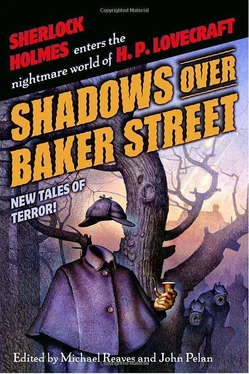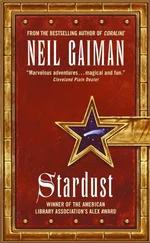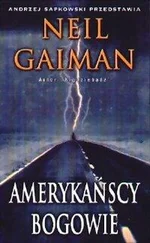The good doctor stood rooted in shock. I heard the report of von Hammerstein’s gun and, a second later, that of Miss Adler’s. I released my empty weapon as Rodney, spitting fragments of words in his excitement, smoothly handed me the replacement. Mr. Waterhouse was turning to cover the beast with shaking hands, unable to fire as long as we stood behind it, craning his neck in an attempt to see both the quarry and his two sons.
The animal stalked forward, opening its flame-rimmed maw, and I heard again the sound I had compared to the pounding of drums or the throb of a mighty heart. The roar went on and on, and my heart quailed and my hands shook as it slunk one pad-footed step forward.
I readied my useless weapon, determined to die fighting, and Miss Adler loosed her second shot. The bullet ruptured the hide of the beast and a ripple shuddered across its surface as if she had tossed a rock into water. A few spattering droplets of fire shot up, falling to the grass, where they smoked and vanished.
Count Kolinzcki staggered back, down on one knee in fright and despair, his hand dropping from his breast to fumble with his weapon. Von Hammerstein held his fire. I knew he would be waiting for a shot at the eye—a forlorn hope, but the one I clung to as well.
The thunder of hooves spoiled my aim. I raised my gaze from my gun sight to witness the arrival of the proverbial cavalry. A lathered bay gelding—of Arab stock, to guess by its small stature and luxurious mane—charged out of the bamboo in full flight. Its flanks heaved and blood-flecked foam flew from its bit. On its back was a mustachioed officer, who hauled up short on the reins and virtually lifted his mount into the air.
It was a prodigious leap: the little horse’s hindquarters bunched and released, and it sailed up and over the back of the Creature. The tigerlike thing twisted in a fruitless attempt to score the horse with its claws, and then recoiled as the rider hurled some sort of pouch at its face. Whatever it was, it hurt! The Creature throbbed again, searing the depths of my ears, and turned and bounded away.
The officer hauled his horse to a stop and whirled it about on its haunches—an unequaled display of horsemanship. The little bay half reared in protest of the hard handling, and then settled down, pawing and snorting.
The officer gentling it with a hand on its neck was a man of middle years, his hair iron gray as was his copious mustache. He had a high forehead and a sensual twist to his mouth, and his eyes glittered still with the excitement of the hunt.
At the appearance of the officer, the Arab turned as if to flee, and almost ran directly into me. He still wove on his feet, and I detained him easily enough.
“Sir,” Miss Adler said, first in command of her wits, “we are indebted to you beyond any repayment.”
“Miss,” he replied, “it is my privilege to serve. And now we must be away, before it returns.”
I identified the British insignia upon his uniform. “Colonel, I thank you as well. I am Magnus Larssen, these good people’s guide. We have wounded.” The beater who had been disemboweled by the Creature was dead or dying quickly, but I could see James picking himself up painfully, his father crouching beside him with an expression of terrible grief. Dr. Montleroy was already trotting to their side.
“Colonel Sebastian Moran, Her Majesty’s First Bengalore Pioneers,” he said. I noticed that in addition to a sidearm and saber, there was an elephant gun sheathed on his saddle in much the fashion that the Americans carry their buffalo rifles.
Von Hammerstein and Rodney were crouched where the Creature had been. Rodney held up a burst leather water bottle: the object that the colonel had thrown in its face.
“There’s no spoor, sahib,” Rodney said. “It leaves no marks in the grass. Like smoke. There are”—a silence—“specks of molten lead.” Bullets, he did not say.
I felt a cold, thickening sensation in my belly: fear.
“Shikari,” began the colonel, but then he hesitated with a glance to the grief-stricken father, and began to dismount and unlimber his gun. “The young man looks well enough to ride. Have him sling the boy over my saddle. We must make it to the river by nightfall.”
He spared a glance for the Arab, and another caress for the exhausted horse. “This man is my prisoner. I pursued him from the border, and I will be bringing him back with me.”
Kolinzcki, rising to his feet, seemed about to protest, but something in the glitter of the colonel’s eyes silenced him. For myself, I merely nodded, and went with von Hammerstein to collect the casualties.
The events of that afternoon return to me now only as a heat-soaked blur. We walked only when we could run no longer. Waterhouse clung to the stirrup of the colonel’s horse, trotting alongside it as he steadied his sons. Conrad still breathed, but he had not regained consciousness, and I believed James was suffering an internal injury: he grew ever whiter and more silent, and most of our water went to him.
I knew the Creature stalked us, as wounded cats will, for every so often I caught a taste of its red scent upon the breeze, and the gelding was hot-eyed and terrified. I feared the poor beast’s wind was broken: it wheezed through every breath and staggered under its double burden, but it kept up gamely.
The colonel had bound the Arab’s hands before him with a leather strap. Through this means, Moran contrived to keep the prisoner upright and moving, although he was staggering from exhaustion.
I came up beside him when we had not been moving long and leaned into his ear. “The Arab is a Tsarist agent?”
“Of a sort,” he said, one wary eye on the individual in question. “A tribal shaman. A personage. And an Afghan, not an Arab.” He raked me with a sidelong glance and I nodded to encourage his discourse. “He was traveling to India with an entourage. We stopped the rest at the border, but this one got through. Fortunately, I’ve apprehended him before . . .” His voice trailed off. “What are your politics, Larssen?”
“I haven’t any.”
He grunted. “Get some.” And walked away.
My especial burden was the fat Count, who staggered along in our wake and complained. Miss Adler kept along nicely, bearing her own distress very well, despite suspicious looks from the Count. Almost, I thought he was about to break into open argument with her, but he directed a hard look at Moran and kept his comments to the heat.
Finally, in the haze of heat and despair, Moran turned on the Count. “If you don’t stop whining, I’ll send you back in pieces!” he snapped, shaking his gun for emphasis.
The Count halted. “A common Englishman does not call me a fool!” he replied sharply. “I am accustomed to a dignified pace, and if this Norwegian idiot had not led us into the lair of monsters”—a rude gesture in my direction—“we’d all be bathed and fed by now!”
The colonel’s prisoner chose this moment to break in, gesticulating and seeming to berate the Count, shrieking in anger. The Count listened for a moment, and shook his head. He glanced around in appeal. “Do any of you understand this barbarian?” he asked, glancing from one to another.
None answered, but Moran’s eyebrow rose in silent speculation.
Night came on more quickly than I could have imagined. My feet were bloody in my boots, and sun blisters rose along the length of my nose where my helmet did not shade it. I grew deaf to the hum of insects, the chatter of monkeys and birds. The sole promise of relief was the black storm front piling up on the horizon: the long-overdue monsoon, racing northward to greet us. Whenever I found the strength to raise my head, I glanced at those bulging clouds, prayerful, but they never seemed closer. As if some invisible army held them besieged, they roiled and tore, but could not advance.
Читать дальше








